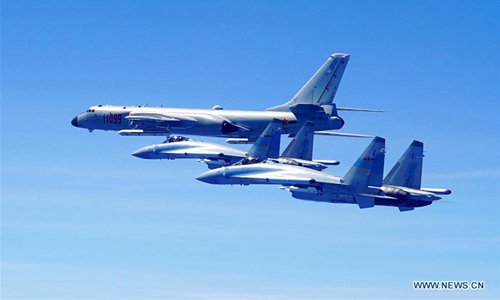HOME >> CHINA
Taiwan Envoy Act risks jeopardizing China-US relations: analysts
By Liu Xuanzun Source:Global Times Published: 2019/12/24 21:24:32

Two Su-35 fighter jets and a H-6K bomber fly in formation on May 11, 2018. The People's Liberation Army (PLA) air force conducted patrol training over China's island of Taiwan on Friday. Su-35 fighter jets flew over the Bashi Channel in formation with the H-6Ks for the first time, which marks a new breakthrough in island patrol patterns, said Shen Jinke, spokesperson for the PLA air force. (Xinhua/Han Chao)
The US bill that seeks to grant the director of the American Institute in Taiwan (AIT) the rank and status of an ambassador risks stepping on the red line of China-US relations, making it unlikely to pass neither in the House nor the Senate, Chinese mainland analysts said on Tuesday, after the bill was introduced in the US House of Representatives.Placed on Monday, the bill dubbed as the "Taiwan Envoy Act" requires Senate confirmation for any individual who is appointed to serve as the director of the AIT, Taipei-based Taiwan News reported on Monday.
Currently, the AIT director is appointed by the US secretary of state without Senate approval, the report said, noting that the bill will accord the AIT director the rank and status of "ambassador at large."
The island of Taiwan is not a sovereign state, nor does the US have official "diplomatic ties" with the island, so the director of the American Institute in Taiwan Taipei Office is not ambassador, Xin Qiang, deputy director of the Center for US Studies at Fudan University in Shanghai, told the Global Times on Tuesday.
The AIT is supposed to be a non-government institution established by the island of Taiwan and the US in January 1979 in accordance with the US' Taiwan Relations Act after the US cut official ties with Taiwan. It ensures the US could continue unofficial relations with Taiwan in terms of business, cultural, and personnel exchanges through the institute, according to taiwan.cn, a mainland news portal affiliated to the Taiwan Affairs Office of the State Council.
Seeing the director of AIT as "ambassador" means the US treats the island of Taiwan as an independent state, which is a straight red line in China-US relations, Xin said.
"I believe this kind of act will not pass [House and Senate] in the first place. Even if it manages to pass House and Senate, executive departments will not make it into a law, because they know well that it will cause serious problem to China-US relations," he said.
This Taiwan Envoy Act is just a new trick among the US' many attempts to improve substantive relationship with the island of Taiwan, Xin said, noting that it is probably a mere expression of the US' support to Taiwan secessionists to contain the Chinese mainland or an attempt by the interest groups that might be raking in money from Taiwan's secessionist authorities.
The US has been using the Taiwan question as a card to contain China's development, analysts said.
Agreements over US arms sales involving F-16V fighter jets and M1A2T main battle tanks have been recently signed, according to a Saturday report by Taiwan news website chinatimes.com.
The US has also been frequently sending warships and aircraft across the Taiwan Straits.
The US 2020 National Defense Authorization Act, which passed the US Senate last week, featured unfounded and biased clauses, including content related to Taiwan island, which blatantly interfered in China's domestic affairs.
The Taiwan-related content of the act has violated the one-China principle and the three joint communiqués between China and the US, and seriously damaged China-US relations, besides jeopardizing peace and stability across the Taiwan Straits, You Wenze, spokesperson of the Foreign Affairs Committee of the National People's Congress - China's top legislature - said on Saturday.
Posted in: HK/MACAO/TAIWAN